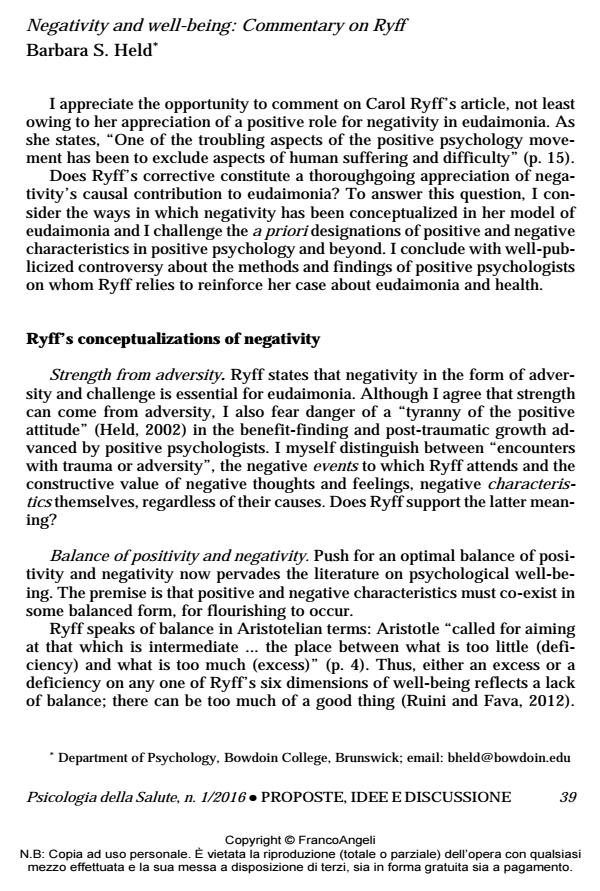Negativity and well-being: Commentary on Ryff
Journal title PSICOLOGIA DELLA SALUTE
Author/s Barbara S. Held
Publishing Year 2016 Issue 2016/1
Language English Pages 5 P. 39-43 File size 38 KB
DOI 10.3280/PDS2016-001005
DOI is like a bar code for intellectual property: to have more infomation
click here
Below, you can see the article first page
If you want to buy this article in PDF format, you can do it, following the instructions to buy download credits

FrancoAngeli is member of Publishers International Linking Association, Inc (PILA), a not-for-profit association which run the CrossRef service enabling links to and from online scholarly content.
- Held B. S. (in press b). Positive psychology’s a priori problem. Journal of Humanistic Psychology.
- Brown N. J. L., Sokal A. D. and Friedman H. L. (2014). The persistence of wishful thinking: Response to “Updated Thinking on Positivity Ratios”. American Psychologist, 69: 629-632. DOI: 10.1037/a0037050
- Brown N. J. L., MacDonald D. A., Samanta M. P., Friedman H. L. and Coyne J. C. (2014). A
- critical reanalysis of the relationship between genomics and well-being. Proceedings of the National Academy of Sciences, 111: 12705-12709. DOI: 10.1073/pnas.140705711
- Fredrickson B. L. (2013). Updated thinking on positivity ratios. American Psychologist, 68, 814-822. DOI: 10.1037/a0033584
- Fredrickson B. L., Grewen K. M., Coffey K. A., Algoe S. B., Firestine A. M., Arevalo J. M. G., Ma J. and Cole S. W. (2013). A functional genomic perspective on human well-being. Proceedings of the National Academy of Sciences, 110: 13684-13689. DOI: 10.1073/pnas.130541911
- Heathers J. A. J., Brown N. J. L., Coyne J. C. and Friedman H. L. (2015). The elusory upward spiral: A reanalysis of Kok et al. (2013). Psychological Science, 26: 1140-1143. DOI: 10.1177/095679761557290
- Held B. S. (2002). The tyranny of the positive attitude in America: Observation and speculation. Journal of Clinical Psychology, 58: 965-991. DOI: 10.1002/jclp.1009
- Held B. S. (2004). The negative side of positive psychology. Journal of Humanistic Psychology, 44: 9-46. DOI: 10.1177/0022167803259645
- Held B. S. (in press a). Why clinical psychology should not go “positive” – and/or “negative”. In A. Wood and J. Johnson (eds.), The Wiley Handbook of Positive Clinical Psychology. NYC: Wiley.
- Kok B. E., Coffey K. A., Cohn M. A., Catalino L. I., Vacharkulksemsuk T., Algoe S. B., Brantley M. and Fredrickson B. L. (2013). How positive emotions build physical health: Perceived positive social connections account for the upward spiral between positive emotions and vagal tone. Psychological Science, 24: 1123-1132. DOI: 10.1177/095679761247082
- McNulty J. K. and Fincham F. D. (2012). Beyond positive psychology? Toward a contextual view of psychological processes and well-being. American Psychologist, 67: 101-110. DOI: 10.1037/a002457
- Miyamoto Y. and Ryff C. D. (2011). Cultural differences in the dialectical and non-dialectical emotionalstyles and their implications for health. Cognition and Emotion, 25: 22-39. DOI: 10.1080/0269993100361211
- Norem J. K. (2008). Defensive pessimism, anxiety and the complexity of evaluating self-regulation. Social and Personality Psychology Compass, 2: 121-134. DOI: 10.1111/j.1751-9004.2007.00053
- Norem J. K. (2014). The right tool for the job: Functional analysis and evaluating positivity/negativity. In W. G. Parrott (ed.), The positive side of negative emotions. NYC: Guilford, pp. 247-272.
- Norem J. K. and Chang E. C. (2002). The positive psychology of negative thinking. Journal of Clinical Psychology, 58: 993-1001. DOI: 10.1002/jclp.10094
- Peterson C. and Seligman M. E. P. (2004). Character strengths and virtues: A handbook and
- classification. Washington, DC: American Psychological Association/ NYC: Oxford University Press.
- Ruini C. and Fava G. A. (2012). Role of well-being therapy in achieving a balanced and individualized path to optimal functioning. Clinical Psychology and Psychotherapy, 19: 291-304. DOI: 10.1002/cpp.179
- Ryff C. D. (2014). Psychological well-being revisited: Advances in the science and practice of Eudaimonia. Psychotherapy and Psychosomatics, 83: 10-28. DOI: 10.1159/00035326
- Wood J. V., Perunovic W. Q. E. and Lee J. W. (2009). Positive self-statements: Power for some, peril for others. Psychological Science, 20: 860-866. DOI: 10.1111/j.1467-9280.2009.02370
Barbara S. Held, Negativity and well-being: Commentary on Ryff in "PSICOLOGIA DELLA SALUTE" 1/2016, pp 39-43, DOI: 10.3280/PDS2016-001005